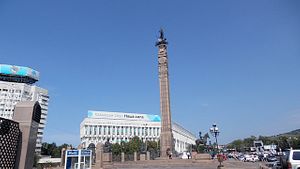Marat Asipov, the chief editor of Ratel.kz, an independent online Kazakh publication, says he has been named a suspect in a libel case involving former Finance Minister Zeinulla Kakimzhanov. According to RFE/RL, Asipov told reporters Wednesday that he had been interrogated for eight hours in Almaty after police raided the Ratel.kz offices and detained Asipov, deputy editor Sapa Mekebayev and columnist Anna Kalashnikova.
Asipov wrote on Facebook that he had to shut down Ratel.kz’s Facebook page. RFE/RL reported that a court ordered the Ratel.kz website blocked in late March, making Facebook its primary method of disseminating information.
On April 2, Kazakh authorities raided the offices of Forbes Magazine Kazakhstan and Ratel.kz, detaining several employees and seizing files and computers. Almaty police reportedly claimed the raids were conducted after an anonymous complaint, from “Citizen K,” that the two outlets were knowingly distributing false information.
RFE/RL later reported Interior Minister Qalmukhanbet Qasymov saying that a “citizen Kakimzhanov” had filed the complaint, accusing the media outlets of libeling him.
Askar Aukenov, chief editor of Forbes.kz, wrote on Facebook that the officers who showed up to the Forbes office had a March 31 court order to search deputy editor Alexander Vorotilov’s desk. Police then took Vorotilov to his home to continue the search.
Former Finance Minister Zeinulla Kakimzhanov, as Eurasianet noted, has a history of enmity with Forbes.kz and Ratel.kz. In January 2017, Kakimzhanov and his son sued the two outlets and in that April a court ordered the two to pay $160,000 in damages to Kakimzhanov and remove the offending articles. The articles alleged that Kakimzhanov and his family were involved in corruption. As Eurasianet wrote, “The publications argued their reports were based on open-source information and statements made by public officials.”
Claiming libel or defamation to hit back at critical reporting is not new to Kazakhstan. In 2016, for example, a court in Almaty ordered the Tribuna/Ashyk Alan newspaper to pay roughly $15,000 in damages to Sultanbek Syzdykov, a former city official. Syzdykov had been accused of embezzling $70,000 from funds for Almaty’s hosting of the 2011 Asian Winter Games. Syzdykov paid the amount back after Kazakhstan’s financial police began investigating him.
Earlier, in February 2010, Kazakh President Nursultan Nazarbayev’s son-in-law Timur Kulibayev sued four media outlets for reporting on and printing a letter penned by Mukhtar Ablyazov, which accused Kulibayev — who is married to Nazarbayev’s second daughter Dinara — of scoring kickbacks from the Chinese for oil contracts signed in 2003. Kazakhstan, at the time, was just a month into its chairmanship of the Organization for Security and Cooperation in Europe (OSCE). Miklos Haraszti, the OSCE Representative on Freedom of the Media, condemned the case
“Shooting the messenger of bad news is an old habit of autocracy that democratic media freedom standards have banned as a dangerous attempt at censorship,” Haraszti said at the time, a sentiment that continues to ring true eight years later.
Kazakhstan’s media environment has suffered from increased pressure in the last few years. Investigative journalism, in particular, has become increasingly difficult. On December 28, 2017, Nazarbayev signed into law amendments to the country’s media laws which, among other things, require journalists to obtain an individual’s permission before publishing information that could be classified as being of a personal, family, medical, banking, or commercial nature.

































